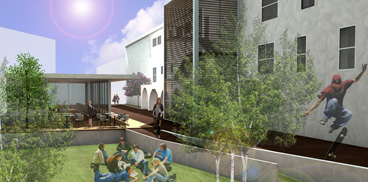Buggerru Eco-Hostel

The project to establish the first minimum environmental impact, eco youth hostel in Buggerru stems from the ambitions of the Municipality of Buggerru and Conservatoria delle coste to provide new economic and socio-cultural opportunities in an area of heightened environmental importance, strong youth unemployment and little structure for tourism. The works give a sustainable response to the growth in demand for quality accessible and ecological facilities in coastal areas. It is a pilot action within the Feasibility Study of the Sardinian Coastal Area Management Programme (CAMP), which is coordinated by the Environment Ministry and UNEP.
Buggerru eco-hostel will become part of the Italian AIG youth hostel network. AIG belongs to the international Youth Hostel Association, the largest youth organisation in the world, created to promote cultural and social tourism in high quality facilities, paying particular attention to the needs of young people, educational groups and the physically handicapped.
The transferring of a building from the Municipality of Buggerru to Conservatoria delle coste has provided the opportunity to guide future use along the lines of sustainable tourism.
The works foresee the creation of a tourist structure, whose management will be developed with the help of environmentally aware staff who will choose innovative and efficient solutions and offer quality services which provide practical education about the environment, and minimising waste with a goal of making the facility zero impact.
The building will be a truly eco-compatible model. A tool to enhance the local area and its environment, which is capable of stimulating integrated initiatives and reinventing the local such that the culture, traditions, environment and history is visible on the international market.
The sustainability of the building is guaranteed by the adoption of necessary technical measure and management strategies: the eco-hostel will be built to satisfy applicable efficiency requirements, and a number of sustainability technical specialists were involved in the project development phases, nurturing the programme ecologically, environmentally and economically. Consequently, the eco-hostel project is defined as “integrated project management”, and the same experts will be involved in the supervision of the implementation phases.
The new eco-hostel project will include:
• restructuring the existing building, which will be used as a dedicated reception centre;
• the opening of a café;
• maintenance and construction of toilet facilities in the former theatre building;
• requalification of the surrounding area.
Alongside these works is a training programme to develop the human resource of the area. This involved local youths who were given theoretical classroom lessons followed by training in the international youth hostel network, both within Sardinia and elsewhere.
Buggerru eco-hostel will become part of the Italian AIG youth hostel network. AIG belongs to the international Youth Hostel Association, the largest youth organisation in the world, created to promote cultural and social tourism in high quality facilities, paying particular attention to the needs of young people, educational groups and the physically handicapped.
The transferring of a building from the Municipality of Buggerru to Conservatoria delle coste has provided the opportunity to guide future use along the lines of sustainable tourism.
The works foresee the creation of a tourist structure, whose management will be developed with the help of environmentally aware staff who will choose innovative and efficient solutions and offer quality services which provide practical education about the environment, and minimising waste with a goal of making the facility zero impact.
The building will be a truly eco-compatible model. A tool to enhance the local area and its environment, which is capable of stimulating integrated initiatives and reinventing the local such that the culture, traditions, environment and history is visible on the international market.
The sustainability of the building is guaranteed by the adoption of necessary technical measure and management strategies: the eco-hostel will be built to satisfy applicable efficiency requirements, and a number of sustainability technical specialists were involved in the project development phases, nurturing the programme ecologically, environmentally and economically. Consequently, the eco-hostel project is defined as “integrated project management”, and the same experts will be involved in the supervision of the implementation phases.
The new eco-hostel project will include:
• restructuring the existing building, which will be used as a dedicated reception centre;
• the opening of a café;
• maintenance and construction of toilet facilities in the former theatre building;
• requalification of the surrounding area.
Alongside these works is a training programme to develop the human resource of the area. This involved local youths who were given theoretical classroom lessons followed by training in the international youth hostel network, both within Sardinia and elsewhere.
